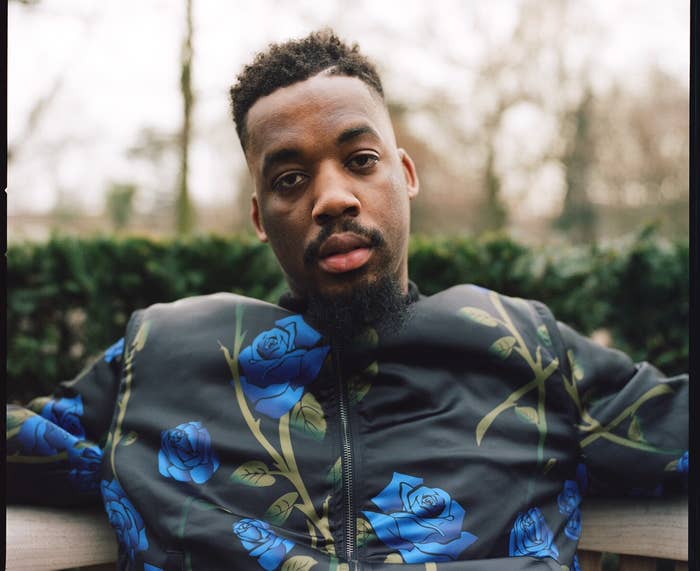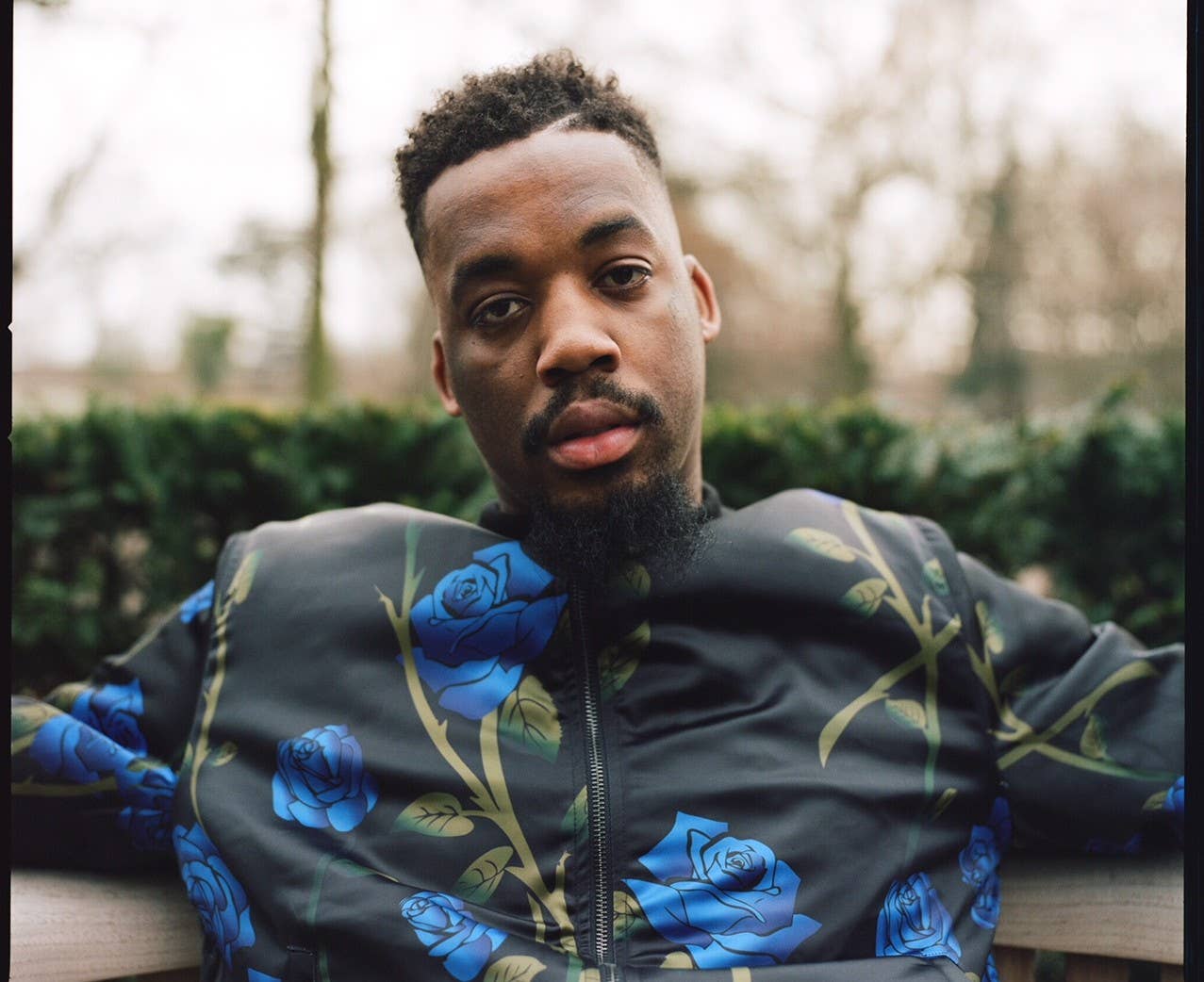
Only in recent years has it become the norm to hear high-octane, quick-fire flows—often associated with the London-dominated scene—from grime artists outside the capital. Emcees like Manchester's Bugzy Malone and Birmingham's Jaykae and Lady Leshurr have helped majorly in breaking down those barriers, as well as the rise of YouTube channels P110 and GrimeBlog—who have helped to bring these acts to the forefront. One such artist benefitting from this shift in the culture is Sheffield-born MC, Coco. Having been steadily bubbling in his hometown, he took the big leap and moved down to London in 2015—linking up with fellow Steel City native Toddla T in the process—and has reaped the benefits ever since. It's this self belief, coupled with hard work, that has seen Coco gain a rapidly growing fanbase, steadily becoming one of the most prominent names in the British music scene.
No Rehearsal, Coco's new EP out on May 25, is comprised of five tracks and includes some of his own production, showcasing the DIY nature of his artistry and indicating that, although he may be a part of this new generation of grime, he understands the origins from which it came. Complex caught up with the AJ Tracey, Nadia Rose and Shola Ama collaborator to get the full lowdown.
One question that needs to be answered before we go on is the story behind your name. How did you get it?
Basically, when I was in Sheffield, I moved to an estate when I was about 8 years old. I went outside one day to make some friends and we were playing with a basketball but it was flat, so when they threw it to me, I've headed it and it made a mad sound and because of that sound everyone was like: "Ahh! He's got a coco bean head." Initially, it was like a diss but out of every negative, you can always make a positive. So, from there, I started secondary school and one of the guys I made friends with was a kid from the area and he was telling everybody about me so people already knew me as Coco. It kinda just stuck from there, really.
You started spitting at the age of 13, right? How did that come about and where did your love for grime come from, considering it was predominantly a London-based genre?
Yeah, it was around that age; 13 or 14—Year 9 times. In terms of picking up the mic and writing bars, that was through my friends. A bunch of my friends in school were already onto it before me, and I sort of got on to listening to what was popular at the time and obviously grime was in its element then; I'm from Sheffield so anything you guys were doing, we probably got afterwards. So I must of heard a couple of riddims, like the "Pow!" refixes with a bunch of different MCs on it, and I think that's when I had my first experience of grime.
Who did you look up to in the scene?
Definitely Skepta—he was definitely one of the standout guys who helped me develop as an MC by just watching him and what he was about, and what he was doing. And obviously, people he was close to as well: Jme, Wiley, Kano, all the people who were bubbling at the time. In terms of my own sort of surroundings, there were a couple man, like All Out Krew which I later became a part of, there was No Excuse, there was SCS—there was a lot, man. Scumfam was another one, but I just felt like I had to find my own thing and make sure I'm doing what I can to stand out.
What's your opinion on the state of grime at the moment?
I think grime is good, man. We can't complain. I mean, I wasn't around in the era when it was first coming up so I can't really speak on my contribution in that respect, but for as long as I've been making grime and seeing where it's come from and where it is now, we've come a long way. People like Stormzy, AJ Tracey, Big Zuu, Capo—there's so many and I'm just proud and happy to be a part of that and to show people that this is our sound, representing what we're about and where we come from. There wasn't much stability in the early stages, but that's the beauty of it. It's not pop or R&B, but the people who've played a big part—pat yourselves on the back, man.
Sheffield is famed for being one of the stomping grounds for the bassline/4x4 scene. Did you ever take an interest in that movement?
Funnily enough, I didn't. I think I made one track just to show people that I can do it, but it wasn't something that I did all the time. Grime back then was always my thing and even though, like you said, bassline was literally on my doorstep, I just thought my love for grime will never die and I was into it that much that I didn't wanna try and do the bassline thing.
Did you ever go to Niche when it was open the first time round?
I didn't go to the first original one because I was too young and, obviously, it got burned down. But I used to go when they called it Vibe. I went there a few times! I wouldn't say I was a regular, but I did show my face.
What were your interests before music?
I've always had this creative side because I like to draw a lot. When I was growing up, I used to see certain things, like cartoons for example, and I used to try and perfect it and see if I could get the drawing the same. So I think I always wanted to do something creative, but if it wasn't that then it would be football-related, as lads do.
When did you decide you wanted to do this as a career?
I think it would've been when I was still in school, maybe a year or so after I discovered it. I started to notice it in my school grades and stuff. Like, my mum and dad were like: "What's going on here?" I started coming home late, I had loads of pieces of paper in my bedroom, I was running riddims on my little hi-fi system. Music took priority over everything! I just had this tunnel vision; it was like it was all I knew, and I felt like I could be good at it.
You've produced two tracks on your new project, No Rehearsal. When did you actually start producing?
I started making beats in 2008. If you knew me and was around me, you would know that I was making beats, but I wasn't making beats to the scale where I was releasing stuff for people to look at me as a producer—I was definitely more of an MC. But yeah, I jumped on Fruity Loops around 2008; I remember my friend, Combat, he was on it before me and I was like: "Yo! I beg you install this on my laptop, fam. I wanna try a ting." And like I said, your Skeptas, your Wileys, they were all self-producing—Jme too—so I wanted to do that as well, and kept on practicing and practicing and learning, and now I'm here.
With new material to perform in the form of your EP, what was the thought process behind No Rehearsal?
To be fair, there wasn't really a big thinking cloud behind it—it was more of a case of, I go to the studio and make tunes, and if they're bangers then I'm happy. I go to the studio to make tunes and create vibes, so No Rehearsal is just a collection of vibes that I've made over a period of time; I think it was like six months or something, and my favourite tracks made the cut. I called it No Rehearsal because, like I said, since I moved to London in 2015, it's just been go, go, go. I was in Sheffield doing what I was doing but it's just been a level up—a big level up—coming to London. I've gone to Ibiza with Toddla, and festivals weren't something I was familiar with in Sheffield—there was no rehearsal for this. I think the EP reflects just how far I've come, with myself producing on two of the tracks and just me as an artist as a whole.
Everything you've said so far has shown how dedicated you are to grime and that dedication to your craft has brought you a lot of opportunities, such as meeting Toddla T. How did that connection come about?
I'm a strong believer in everything happens for a reason. So I live in London now, but when I first moved down to London, either the first or second night I was at XOYO and our mutual friend, who's also from Sheffield, said I might as well come down and see wagwarn since I'm gonna be around more. And then, literally like the next day, I was in the studio with him and Danny Weed. You see Toddla? He's one of them guys who moves straight away—like, what's the point in waiting?—so he was like, "Come studio tomorrow." I went there and he was with Danny Weed and even that, for me, was kind of surreal because Danny Weed played a pivotal role in the grime scene with his instrumentals and whatever else, so it was like: "Rah! is this really happening?" From there, we were all systems go.
Another massive experience was your 2016 trip to Jamaica. What was that like and what made you want to make that experience a documentary?
That was very sick, man. I think Toddla was going out there anyway with 1Xtra and I did the tune ["Ova Here"] with Protoje before that. I met Protoje for the first time at Carnival when I first ever performed on the Toddla T stage. I must have come off stage and he must've seen my performance and was feeling it. A day or two after that, I was in the studio with him again and remember thinking, "How are these things just happening?" So I did my verse, he went back to Jamaica, I did my second verse, sent it over and he was feeling it. Then Toddla was like: "Do you know what? I'm gonna get you out to Jamaica. I'm not gonna confirm it yet, but I'm going to try." Then he confirmed it and we went there. Big up Red Bull as well because they were involved—they made it happen. It was the first time I'd been over there, and it's my heritage so I thought I might as well delve into the family tree. So I saw some of the family and just thought to film a documentary because I didn't know when I'll be back next or if I'll get the chance to come back. We also shot the video for "Ova Here" out there with Protoje.
On the subject of travelling—at this point, you're pretty much a festival veteran. What is it about performing at festivals that you love so much?
With festivals, I've performed at so many places, but the difference between a festival compared to like a club night or a normal booking is that everyone is there to do the mad ting! If you're coming to a festival, you know what time it is—it's a given. And the energy from the crowd, the good vibes; for me to be on stage, performing to whatever number it is, it's just a good feeling. Everyone's come out to have a good time and they're watching me, and they're happy to see me on that stage. So performing at festivals, for me, is a feeling like no other.
What made you decide to move from Sheffield to London? It's seemingly been a pivotal moment in your career thus far.
If I'm being very honest, I was coming up and down before anyway because my partner's from London, and that's one of the reasons I was going to move. With Sheffield, I've been there my whole life and I was thinking, "What am I going to do in the future? What's my goal?" I knew I had this talent while working 9-5 jobs, but I wanted it to be my main focus in life because '’ve sacrificed a lot and I've put all my efforts into it. So, one day, I just got this click in my head like: "If you're gonna do it, just do it." And by the grace of God, I was able to move down. It's not easy starting from scratch—I didn't know anyone in London—but then I look at where I am now, and none of it would've been possible if I didn't put the work in.
When you see other emcees from outside of London making waves, such as Bugzy Malone from Manchester, do you feel like you're flying the flag for Sheffield or do you not really think of it like that?
Maybe I'm being modest but if you ask someone else, they would probably say yes, but I guess… I'd say yeah, man. I'd say yeah, but it's not just me though: Deep Green is doing his ting—he's not grime, but he's doing his ting—KDOT, Smiley, a few others, they're all doing their thing but I think because of what I'm doing and me being down here in London, I'm doing a lot more than what I was doing before so people might just be like, "Oh yeah! You're the guy from Sheffield." But there's other talents from Sheffield. Not just me.

